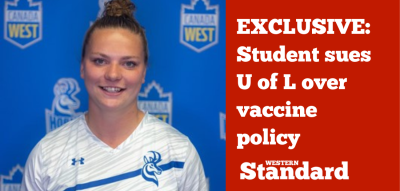Student Sues University of Lethbridge, Alberta Over Vaccine Mandate
Hayley Nassichuck-Dean applied for a religious exemption with both the U of L and her soccer team but was denied. She inquired about taking online classes but was also refused.

All Global Research articles can be read in 51 languages by activating the “Translate Website” drop down menu on the top banner of our home page (Desktop version).
To receive Global Research’s Daily Newsletter (selected articles), click here.
Visit and follow us on Instagram at @crg_globalresearch.
***
A student at the University of Lethbridge (U of L) is suing the institution for imposing a COVID-19 vaccine passport policy calling it “unconstitutional.”
Hayley Nassichuck-Dean is a fifth-year student at U of L and plays on the university’s women’s soccer team.
Nassichuck-Dean, an undergraduate in the biology program, was intending to complete her studies at the end of the school year in 2022 and move on to veterinary studies.
“Partway through the fall, Alberta post-secondaries removed the (COVID-19) testing option they had initially provided when they came out with their vaccine mandates at the beginning of the school year,” said Carol Crosson, of Crosson Law, the lawyer representing Nassichuck-Dean.
“As a result, students were now required to either vaccinate or vacate campus altogether.”
U of L released its vaccination policy mid-August before the start of the school year requiring all attending the campus to either be fully vaccinated, submit to regular COVID-19 testing or produce an exemption.
On September 13, after students had registered and begun classes, the U of L updated their policy to state anyone not fully vaccinated by November 1 would no longer be permitted on campus and rapid testing would no longer be an option.
In the following days, the province announced new public health orders including the Restriction Exemption Program (REP) allowing eligible businesses and institutions to choose whether to adopt a vaccine passport system or reduce occupancy limits to one-third of fire code limits.
Under the new provincial orders, post-secondary institutions are allowed to establish and implement their own proof of vaccination policy. Around the same time, the government of Alberta also provided a provision for post-secondary institutions to apply for government funding for regular COVID-19 testing expenses.
Although the option for funding testing expenses was offered, many post-secondary institutions, including the U of L, remained firm on the requirement to be fully vaccinated to come on campus.
“As a result, many hundreds of Alberta students are now at home, unable to continue their education, without the future they dreamed of,” said Crosson.
Nassichuck-Dean applied for a religious exemption with both the U of L and her soccer team but was denied. She inquired about taking online classes but was also refused.
“The Policy and decisions of the U of L to refuse to allow the Applicant to continue in her activities unless she engages in the medical treatment of taking the vaccine infringe the right to life insofar as they pose an unnecessary and unknowable increased risk of death to the Applicant who by being compelled to take the vaccine faces a possibility of adverse effects, including the chance of death,” the statement of claim reads.
The statement goes on to claim the U of L’s decisions infringe on Nassichuck-Dean’s right to security because they “undermine the applicant’s right to control her own bodily integrity,” adding they have also caused her psychological stress.
“We say that the post-secondary institution vaccine mandates are a breach of Charter s. 7 which protects the right to autonomy or informed consent in regard to medical treatments,” said Crosson.
The lawsuit also claims the university’s vaccination policy is “too extreme” and goes “beyond what is required to achieve the objective.”
“It’s clear from studies that both the unvaccinated and vaccinated are getting and passing on COVID-19,” said Crosson.
“It’s hard to understand how post-secondary institution mandates are accomplishing the goal of decreasing the spread of COVID-19. Students left on campus now are still passing on COVID-19 and will continue to do so in January while their unvaccinated friends sit at home.”
Crosson also claims the U of L’s policy is discriminatory for denying Nassichuck-Dean’s religious exemption as it interferes with her “sincere held religious beliefs” and violates her right to religious freedom under section 2 of the Charter.
“Students across Alberta just want to continue their education,” said Nassichuck-Dean.
“They don’t want to be punished for their medical choices. Discontinuing a testing option does just that.”
The lawsuit is seeking numerous remedies including a reversal of the U of L’s policy to “cease offering the option of rapid testing” calling it “unreasonable” and to reverse its decision to reject Nassichuck-Dean’s religious exemption calling it “illegal.”
Crosson is also seeking court costs be covered for Nassichuck-Dean’s case.
“Post-secondary students all across Alberta have now been sent home, their studies discontinued, because post-secondary institutions have vaccine mandates which no longer even permit regular testing as an option,” said Crosson.
“‘Vaccinate or vacate.’ We contend that this is not about health and safety or these institutions would consider, for example, testing all students on campuses.”
*
Note to readers: Please click the share buttons above or below. Follow us on Instagram, @crg_globalresearch. Forward this article to your email lists. Crosspost on your blog site, internet forums. etc.
Melanie Risdon is a Calgary-based Reporter for the Western Standard. She has over 20 years experience in media at Global News, Rogers and Corus. [email protected]
Featured image is from The Western Standard

